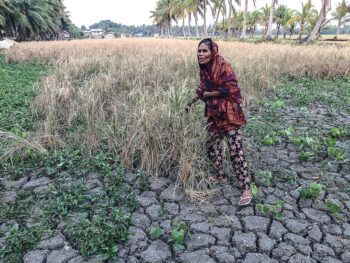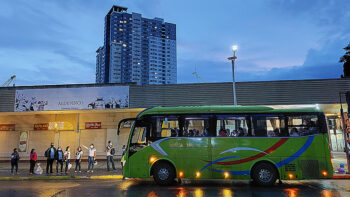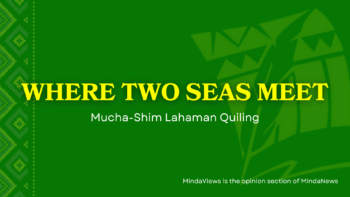
BOOK REVIEW: SO MUCH GOODNESS
Stories and Thoughts in My Life Journey
Author: Bert Cacayan
Published by Alberto Reserva Cacayan
Davao City, 2023
The world today has been labelled VUCA by a few social scientists, that is, it is a world that is volatile, unorganized, confusing and ambivalent. Especially as a result of the health scare brought about by COVID-19 pandemic, the string of devastating natural calamities, the Ukraine War, the economic crisis and instability of many governments, one can understand why mental health has become a major area of concern across the world. We are all bombarded with stress and anxiety as life on Earth seems to have moved towards a dystopian future.
We need a respite from a life lived in fear, grief and worries. Not through an escape into an existence that wallows in various addictions (alcohol, drugs, and promiscuity) or mainly spent in escapist entertainment. Not through staying put in our own little comfort zones enjoying the luxuries of life without any care about the needs of others, societal ills, and environmental degradation. But by digging deep into a deeper appreciation of what are still the positive elements making our lives meaningful and mobilizing our inner strength to sustain our commitment to make the world a better place for all creatures!
This invigorating process can be assisted through various ways, including reaching out to the needy and most abandoned, prayer and contemplation, a walk in the forests, playing games with children and reading a book. One book that can be recommended for this purpose has just been published and the reader who gets a copy of this book could be inspired to face the challenges posed by the VUCA world of today.
The title—So Much Goodness: Stories and Thoughts in My Life Journey—captures what this book is all about, namely, a celebration of life’s goodness that one person has been gifted with. It is thus a eulogy to one’s life, detailing all that one needs to be grateful in life, highlighting the positive in the midst of life’s travails and pointing out the blessings that make such a difference in our human existence. It thus generates energy towards living a life with a purpose!
The author, Bert Cacayan, is a true blood Mindanawon. Born and growing up in a working class family in a rural town (Buenavista, Agusan del Norte), acquiring an education in mostly schools in Agusan and Davao, he had had an extensive exposure to the ugly and harsh realities among the poor and oppressed—from Mindanao to various Southeast Asian countries where he later on served in various development agencies.
Cacayan’s book celebrates! And one has to read the book to find out why. So Much Goodness is neither an autobiography or memoirs, although after reading the book one does have a fair idea who Bert Cacayan is and what his life is all about. But it is a rare book that allows us to penetrate through the brilliant mind of the author, but also provides us a glimpse of his soul. For there are parts of the book that Cacayan speaks from the depths of his heart and one needs to read slowly the texts so as not to miss the inner meanings.
So what kind of a book is So Much Goodness? It is an anthology constituted by poems (40 of them mainly constituting Chapter I), essays, letters, parables, stories and faith reflections. The author’s thoughts are clearly enunciated, so are his principles in life, the values he hope to pass on to his children, beliefs that matter to humanity, ideas that we should consider for our own lives and more. In the poem, “Be Humble,” he writes:
Be brave. Be humble. Be committed. Firmly standing up to values and principles
Supporting the needy, lowly and vulnerable. Protecting the ravaged environment
Partnering with people working for change. Slowly and steadily actualizing life’s dreams.
Back to his roots, early on it was quite clear that Bert had the makings of a scholar whose brilliant mind will be tapped for development work. In both high school and college, he graduated as valedictorian. He studied philosophy and theology at the St. Francis Xavier College Seminary and the Regional Major Seminary of Mindanao in Davao City, and the Loyola School of Theology in Quezon City, Philippines.
He was elected as the Executive Secretary of the MSPC Secretariat from 1980 to 1983, and soon after, became a management consultant to funding agencies in Europe, such as NOVIB-Oxfam, Cordaid (Catholic Organization for Relief and Development Aid), and CIDSE (International Cooperation for Development and Solidarity), particularly its program for Vietnam, Laos, and Cambodia. Cacayan followed management courses in the Netherlands and in Germany. Meanwhile, he became a member of Ecumenical Association of Third World Theologians (EATWOT) ) and a founding member of the Lay Forum Philippines and the Lay Organization in Mindanao (KALAMI).
Later, he founded the Managing Alternatives Group Incorporated (MAGI), a management training-consultancy institute based in Davao City, and the Amaya Lay Foundation Incorporated (ALFI), which served the needs of widows and orphans of spouses and fathers who perished during Martial Law in Mindanao.
From 1997 to 2017, Cacayan worked with terre des hommes Germany, a child rights organization that finances and supports projects working for children’s rights, women empowerment, and environmental protection, serving as the Philippine Country Coordinator; and for 11 years and then worked as the Regional Coordinator for Southeast Asia, while being based in Bangkok, Thailand.
The book—with a total of 225 pages which have photos and drawings (by Nonoy Rodriguez)— is handsomely packaged by Doris Lois Rifareal. Abraham Garcia’s cover is also impressive. Five chapters and an Epilogue constitute the book’s content. Chapter 1 is a collection of poems. From the titles of the poems, one can tell that the poet-author’s thoughts centered on a number of themes: human goodness and positive values, life’s brutal realities, positive character traits, self-care, theological discourses and concern for country.
In Chapter 2, the author shares stories and thoughts of past engagements that remain relevant and meaningful until today. The four articles in this chapter include a piece where the author articulates his reflections on the spirituality of hope in the context of poverty and oppression. The second and third articles are a reflection on his pastoral experiences during the martial law years (1975-1986), particularly in lay empowerment, community organizing, and building basic communities. The fourth article provides the reader with a bird’s eye-view to his 20-year engagement with terre des hommes Germany. This development work affirmed his conviction that children’s rights are human rights and, thus, must be defended, respected, and fulfilled. There is also a section in this chapter that provides us a window into appreciating Cacayan as a contextual theologian, following basically the framework of decoloniality. For apart from being a distinguished development worker and management consultant, he is also a theologian through an articulation of a lagutmon theology.
In Chapter 3, Cacayan writes about his friends and heroes, and the list includes Tranquilino Cabarrubias (a GKK peasant-leader martyred during martial law for his commitment to justice), Fr. Abesamis, his two colleagues during MSPCS days (Sr. Mary Fe Mendoza, RGS, and yours truly), the Missionaries of the Assumption (M.A. Sisters), Fr. Gervais Turgeon (philosopher), Francis Morales (revolutionary), Fely Soledad (educator), and Ed Caharian, (leader-manager). His tributes of his parents and uncle are also in this section.
Chapter 4 is on Play, Love, and Work. This chapter includes a letter the author wrote to his two sons—All David and Lukas—about the art of playing team basketball. It provides a fatherly advice to his sons for the love of the game which he played since childhood with his brothers. The second article reveals his thoughts on what makes a happy marriage. The third article discloses secrets on running a successful business enterprise as he gave pointers to a colleague from Myanmar who wanted to venture into a business enterprise. Her enterprise would have been a great success by now if not for the recent military coup. Two other articles are in this chapter: Gratitude for the Gentle Humanity and When the Real Fun Begins.
In Chapter 5, the author shares Learning from the Wisdom of the Andeans, followed by—A Call for Solidarity the People of Myanmar—Bert wrote about the recent history of Myanmar. He has had a few visits to this country and would have been exposed to the realities of their grassroots before the coup. With how the situation has further worsened, he is one voice advocating greater solidarity with the struggling Myanmarese people. In both articles, the author is clearly a person who is very contextualized locally, but has been also engaged globally. This chapter ends with an article on his Pilgrimage Walk in Camino de Santiago.
Clearly it is a life full of blessings in the actual persons he has known (family, friends and colleagues, including grassroots leaders), rich experiences in the field of development work, significant experiences of global exposure due to work opportunities, opportunity to serve the most abandoned, courageously surviving life’s adversities, including the risks and dangers of martial rule, and finally being recipient of plentiful grace from the heavens. For all these, we can truly understand why he shouts out to the world – There is so much GOODNESS out there!
Which is why a person like Cacayan cannot be but a kind and caring person, compassionate and committed to be at the service of others. While clearly, Cacayan can easily belong to the list of a group of young men and women whose clarity of vision, strength of commitment, courage of purpose, brilliance of ideas, authenticity of spirit, kindness and graciousness and a deep sense of hope make them stand out as that generation’s model, it is this deep seem of care and compassion for others that make him stand out. In the book’s Epilogue the author leaves the reader with these inspiring words:
The fight between good and evil
does not seem to know an end.
It is incessant. But we believe good will triumph.
Not at the end of time but in the here and now.
We don’t have to wait for Judgment Day to tame
And subdue evil once and for all.
We can do good each moment of our day,
In every place, to everyone, and for all.
Books are sold at P750 per copy, although church workers and development NGO workers are given special discounted price. Books can be ordered through the following: Luis Cacayan (09178806001) for those in Metro Manila and Luzon; Leo Cacayan (09633461586) for those in Caraga and Northern Mindanao, Nonoy Cacayan (09322161361) for Davao and Southern Mindanao, and Bert Cacayan (09295495809) for Visayas and international orders).
(MindaViews is the opinion section of MindaNews. Redemptorist Brother Karl Gaspar is Mindanao’s most prolific book author. Gaspar is also a Datu Bago 2018 awardee, the highest honor the Davao City government bestows on its constituents. He recently moved to his new assignment in Cebu City.)






